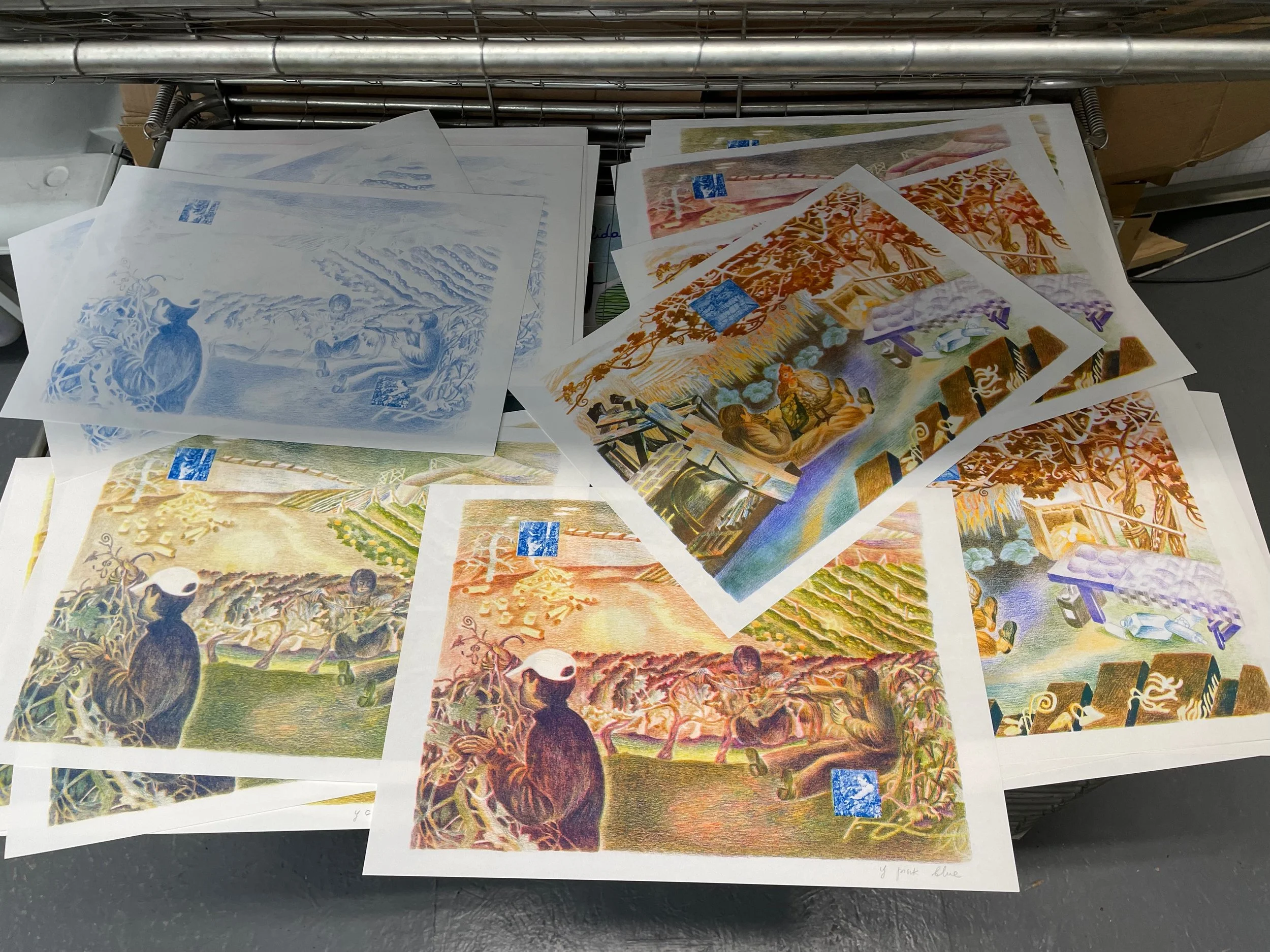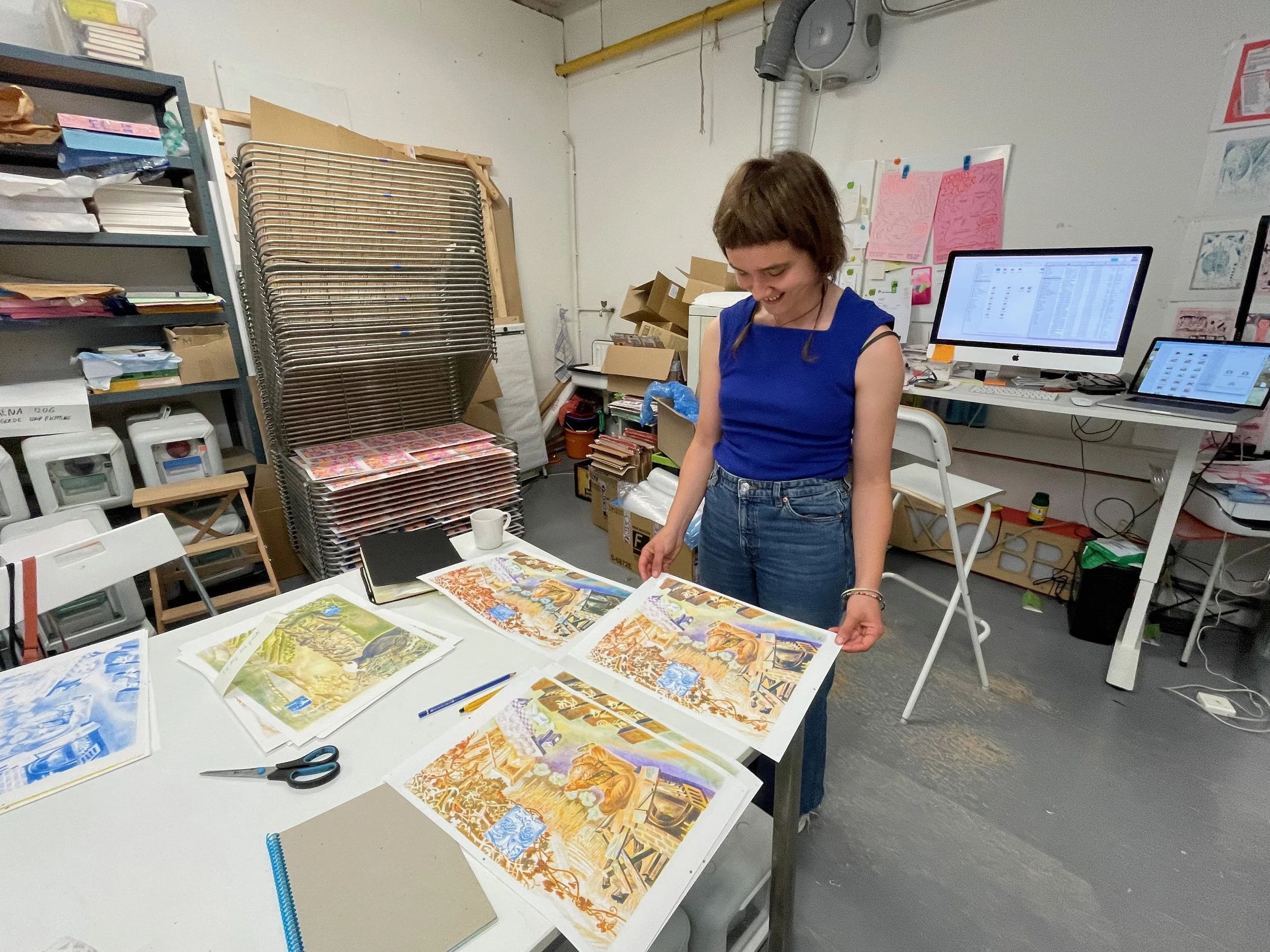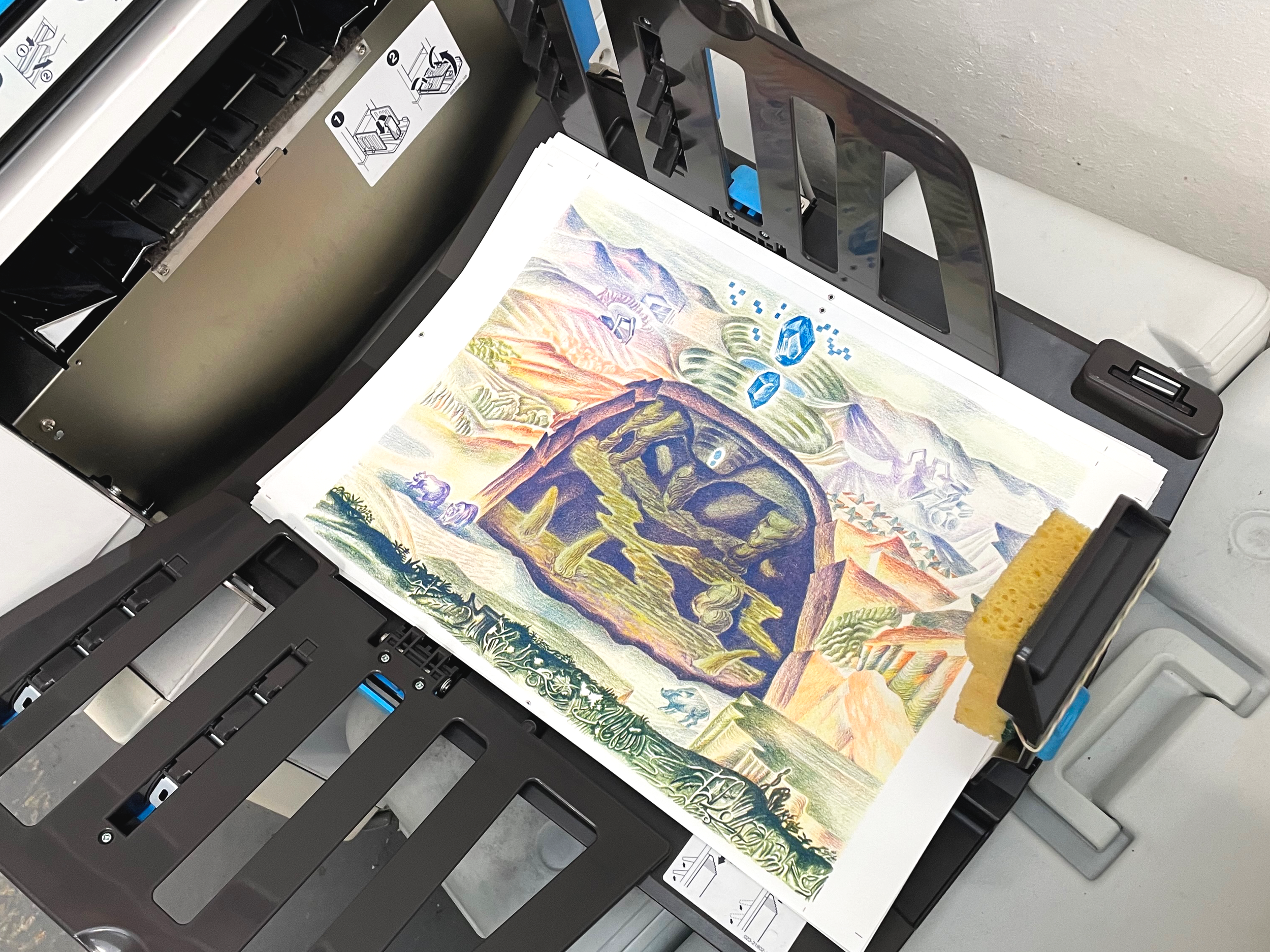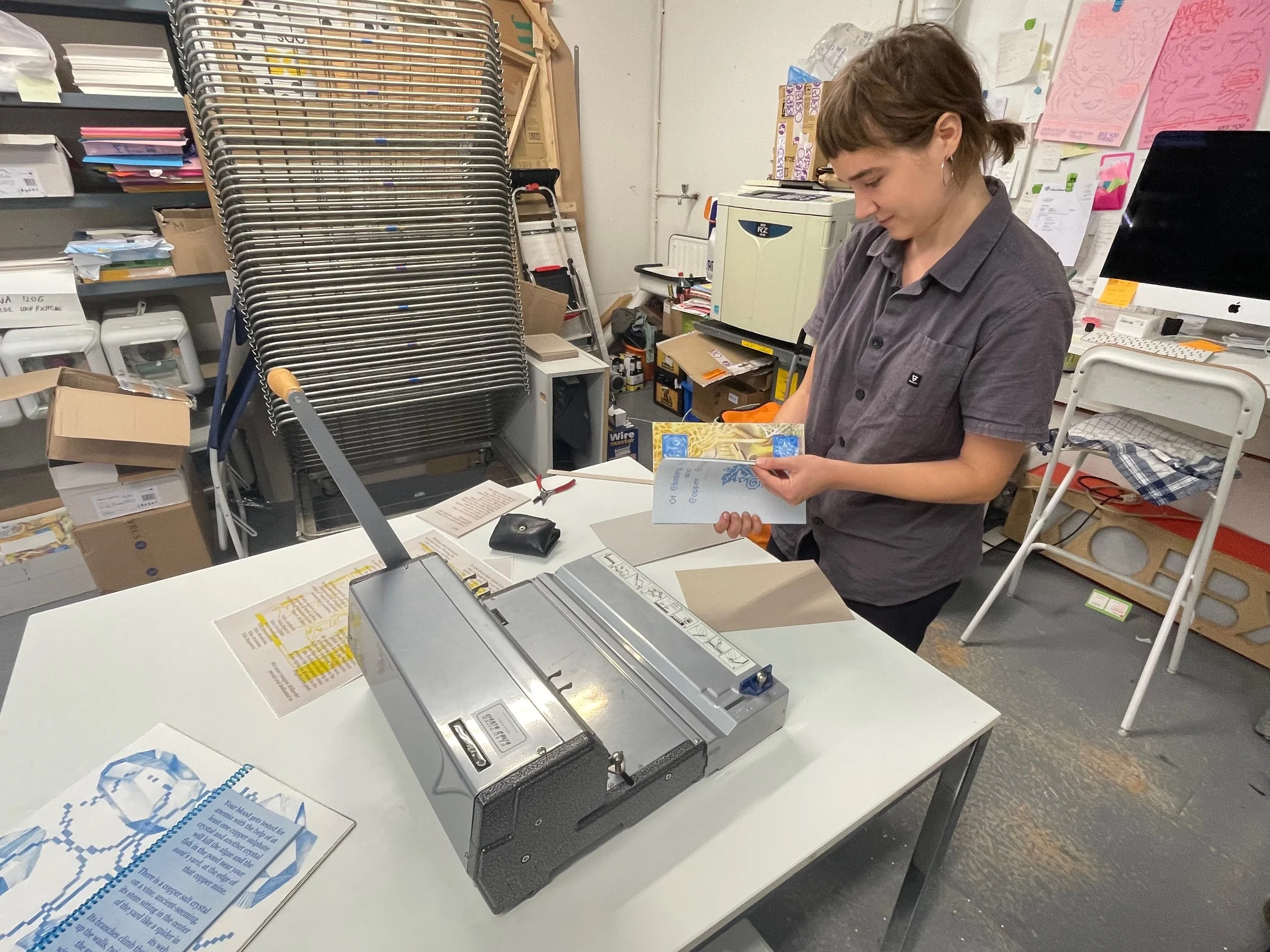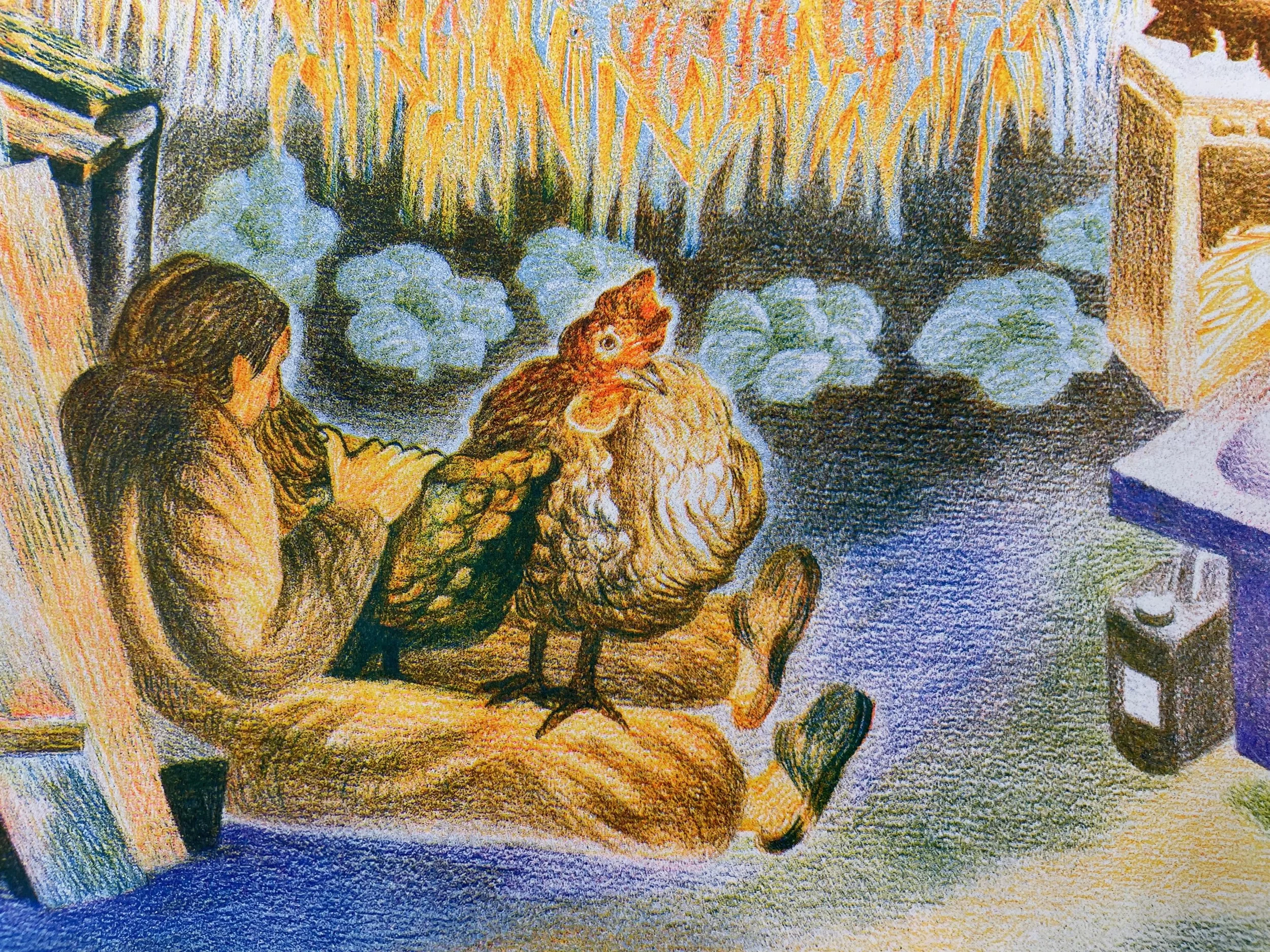Wobby Workout is a work period at our studio in NS16, Tilburg. In this focused setting, artists can explore and experiment with the Risograph printer, developing new ideas and techniques independently. In the summer of 2025, multimedia artist Marina Sulima (born in Moldova, living in the Netherlands) joined us for a residency. During her time in the studio, she explored how drawing and printing could merge, treating the Risograph as an extension of her practice.
“It was like a playground, where I had the Risograph as another pencil box. It gave me time to experiment with drawing, and that is priceless. Also, it’s really a workout! Changing color drums is a proper squat routine.”
The residency served as the starting point for Of Climbing Vines and Copper Crystals, an essayistic book co-authored with Jesse Havinga. The publication intertwines drawings, archival fragments, recipes, and poetry into a tactile reflection on landscape, labor, and memory.
“There are a few villages on the banks of the Răut River. The houses, often made out of limestone and clay from the riverbanks, are painted blue. Sometimes the pigment is added with copper sulfate, which is also used in vineyards as a fungicide. I tried to understand whether there’s a relationship between them. That search led me to the topsoil, to the thin, fertile layer of earth that sustains life. It is estimated that in less than 100 years, little will remain of this critically fertile layer.”
Her fascination with blueness, the color of the houses, the soil, and the crystals themselves became the root of the project. The book connects ecological observation with personal memory, exploring how traditions and materials shape a sense of place.
“The text blends the history of a copper sulfate fungicide used in vineyards with a funerary ritual from Moldova called Paștele Blajinilor (The Easter of the Mild Ones). People eat and drink homemade wine near the graves of their relatives. Almost every grave has a blue cross. It’s an ancient pagan ritual, absorbed into Christianity. The Orthodox priest blesses a cup of homemade wine, poured over graves in the shape of a cross as cedar smoke fills the air. This spring, I had my first religious experience at The Easter of the Mild Ones. After working on the land for a few weeks in spring, I felt related to the deceased. From the hills, I saw landscapes shaped by small-scale farming: old vineyards and grazed fields, now changing as machines replace labour and tourism replaces farming. When the church choir sang, ‘Christ has resurrected from the dead. He tramples death over death, with death. And he gives life to all those in the graves,’ I thought about all those who worked these hills: humans, grazers, and all the tiny soil organisms. Aren’t they all trampling death and giving life? Do they not constantly die and resurrect, in spring, in every green shoot of every plant we eat?”
Through this merging of soil, ritual, and memory, the work contemplates how humans and landscapes are bound together through cycles of labor and care. As the project evolved, Marina began to notice how the blue copper crystals gradually took shape throughout the book.
“The text and drawings focus on habits, ‘habit’ as a disposition, a pattern that repeats again and again, always with a small difference. Habit is what characterizes living beings, which they form and pass on to others. It is precisely the sum of habits of cells and organisms that form our habitats. And so the sum of habitats is nothing else than our world. Crystals, too, have habits. They each carry themselves slightly differently, growing gradually here, spurting there. Prismatically, cubically, sceptered, amygdaloidal, reticulated. Or blue. Big bright blue. Deadly, fungicidally blue. The blue copper sulfate crystals appear on the first page of the book, emerging from a copper mine. Then, they slowly infiltrate the rest of the book, forming patterns and narratives. The patterns they form are inspired by patterns in the carpets from Moldova.”
Throughout the book, recipes appear as gestures of repetition and transformation that reflect the work’s themes.
“I see recipes as habits. They repeat, each time with a slight difference, and they shape habitats. Each recipe relates to one of the blue illustrations, both as inspiration and as an afterthought.”
Behind the poetic reflections lies an ecological question about how we relate to the living world around us and to the soil that sustains it.
“It suggests that we’re related to a big family of historical bodies and their habits. The labour of all living beings created the conditions for our metabolism. This is the family we’re biologically tied to, our unchosen kin. The work makes you think about the relationships within this critical family. Can drinkers of wine be kinder kin to soil life? How can we eat, metabolize, and drink otherwise? In the face of pests and fungicides, of ecological damage and colonial entanglements, what habits of cultivation and family celebration should we reform to care for “the topsoil and its habits of making life hereafter”?
For Marina, the residency was not only a time for creation but also for learning and connection.
“The invitation to do a Wobby Workout gave me the push to bring this work together in the form of a book. I learned a lot about risograph printing from Marjolein Schalk and became really independent in the process. It was satisfying and addictive. And yes, it makes you forget about the time.”
Created during her Wobby Workout residency, Of Climbing Vines and Copper Crystals brings together drawing, writing, and risograph printing in a poetic reflection on soil, rituals, and blue copper crystals.


